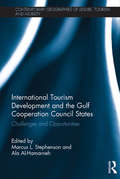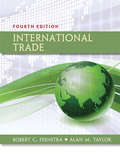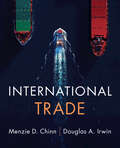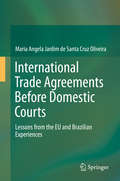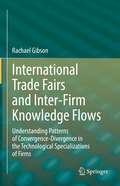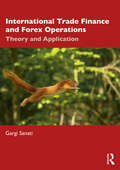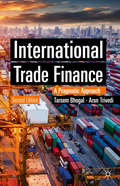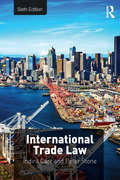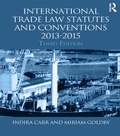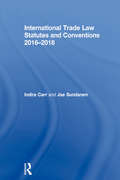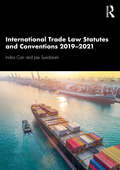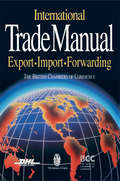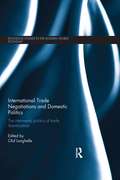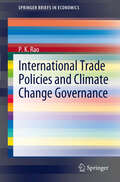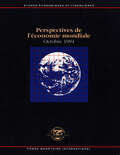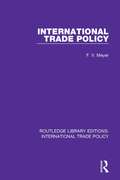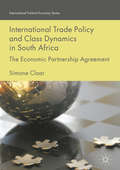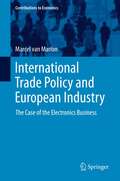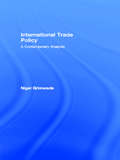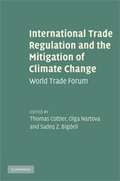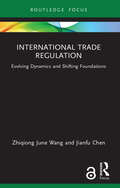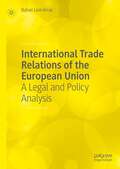- Table View
- List View
International Tourism Development and the Gulf Cooperation Council States: Challenges and Opportunities (Contemporary Geographies of Leisure, Tourism and Mobility)
by Marcus L. Stephenson Ala Al-HamarnehThis book examines the challenges facing the development of tourism in the six member states of the Gulf Cooperation Council (GCC): Bahrain, Kuwait, Oman, Qatar, Saudi Arabia and the United Arab Emirates (UAE). This region, which largely comprises the Arabian Peninsula, possesses some of the fastest growing economies in the world and is remarkably unique. It shares similar associations and affinities: tribal histories, royal kinship, political associations, Bedu cultural roots, Islamic heritage, rapid urbanization, oil wealth, rentier dynamics, state capitalist structures, migrant labour, economic diversification policies and institutional restructuring. Therefore, this volume takes the study of tourism away from its normative unit of analysis, where tourism in the region is being examined within the context of the Middle East and the wider Islamic and Arab world, towards an enquiry focusing on a specific geo-political territory and socially defined region. Although international tourism development in the region embodies a range of challenges, complexities and conflicts, which are deeply contextualized in this volume, the approach overall does not endorse the normative ‘Gulf bashing’ position that has predominated within the critical enquiries in the region. It presents a forward-looking and realistic assessment of international tourism development, examining development potentialities and constructive ways forward for GCC states and the region as a whole. This edited volume provides a real attempt to examine critically ways in which tourism and its development intersect with the socio-cultural, economic, political, environmental and industrial change that is taking place in the region. By doing so, the book provides a theoretically engaged analysis of the social transformations and discourses that shape our contemporary understanding of tourism development within the GCC region. Moreover, it deciphers tourism development’s role within the context of the GCC states undergoing rapid transformation, urbanization, ultra-modernization, internationalization and globalization. In addition to state-specific illustrations and destination case studies, the work provides insights into relatable themes associated with international tourism development in the region, such as tourism’s relationship with religion, heritage and identity, the environment and sustainability, mobility and cross-border movements, the transport industry, image production and destination branding, mega-development and political stability and instability. The book combines theory with diverse case study illustrations, drawing on disciplinary knowledge from such fields as sociology, political economy and social geography. This timely and original contribution is essential reading for students, researchers and academics in the field of tourism studies and related subject areas, along with those who have regional interests in Middle East studies, including Gulf and Arabian Peninsula studies.
International Trade
by Robert C. Feenstra Alan M. TaylorDeveloped in the classroom by two of the most prominent researchers in the field, Feenstra and Taylor’s International Economics uses engaging applications to provide a modern view of the global economy for a modern audience. Most international economics textbooks emphasize theory and the economies of advanced countries. Feenstra and Taylor combine theoretical coverage with empirical evidence throughout, while reflecting the realities of the global economy by covering emerging markets and developing countries (India, China, Southeast Asia). The new edition has been thoroughly updated to include new data and Applications, as well as many new Headlines to reflect the rapid changes in international economics during the last three years. The 4th Edition includes the latest on opening relations with Cuba, immigration and Europe’s refugee crisis, the effect of NAFTA on wages and employment, job polarization, quicksourcing, China’s problems, and the debate in Britain about leaving the European Union.
International Trade
by Menzie D. Chinn Douglas A. IrwinUnderstanding the globalized world economy is more important than ever before. This book provides a clear, concise, and up-to-date look at the economic foundations of international trade. The authors explain the principal concepts in an engaging and accessible manner open to students from any discipline, incorporating contemporary trade data through full-colour diagrams and graphs. Throughout, economic models are discussed in the context of recent and current international trade issues, to ensure students gain a concrete understanding and see how the field impacts the real world. Written for upper undergraduate courses, the book includes feature boxes that marry theory and economics in practice to show models applied, a featured real-world application for every chapter, and over 100 end-of-chapter questions help students fully engage with and consolidate their learning. Online resources for instructors include a solutions manual, lecture slides and the book figures as JPEGs.
International Trade Agreements Before Domestic Courts
by Maria Angela Jardim de Santa Cruz OliveiraThis book addresses the role of domestic courts in the enforcement of international trade agreements by examining the experiences of Brazilian and the European Union courts. This comparative study analyzes the differences, similarities and consequences of Brazilian and European courts' decisions in relation to the WTO agreements, which have "direct effect" in Latin American emerging economies, but not in the European Union or other developed countries. It observes that domestic courts' enforcement of international trade agreements has had several unintended and counterproductive consequences, which were foreseeable in light of international scholarly debate on the direct effect of WTO agreements. It draws lessons from these jurisdictions' experiences and argues that the traditional academic literature that fosters domestic courts' enforcement of international law should be reconsidered in Latin America in relation to international trade agreements. This book defends the view that, as a result of their function and objectives together with the principles of popular sovereignty and democratic self-government, international trade agreements should not be considered to be self-executing or to have direct effect. This empirical work will be valuable to anyone interested in the effects of international trade rules at the domestic level and the role of domestic judges in international law.
International Trade Disputes and EU Liability
by Anne ThiesThe European Union has become the respondent of several international trade disputes. This book examines the right to compensation for damage resulting from retaliatory measures imposed under the system of the World Trade Organization in disputes triggered by the EU. Anne Thies evaluates the implications of the EU's membership in the WTO for its domestic system of rights and judicial protection. Emphasising the necessity to maintain EU standards of protection independently of the external dimension of EU action, the book offers suggestions on how the current gap of protection could be filled while upholding the scope of manoeuvre of the EU institutions on the international plane. Moreover, it places the issue in its broader context of the relationship between international and EU law on the one hand, and the discretion of the EU as a global actor and standards of individual rights protection under EU law on the other.
International Trade Fairs and Inter-Firm Knowledge Flows: Understanding Patterns of Convergence-Divergence in the Technological Specializations of Firms
by Rachael GibsonAgainst a backdrop of economic uncertainty caused by a shift toward protectionism and the COVID-19 pandemic among other issues, this book suggests that international trade fairs (ITFs) represent a vital source of economic dynamism that can support national and regional economies by creating opportunities for firms to access new markets, network with key actors in their industry or value chain, and tap into valuable external knowledge flows regarding new technologies and innovations. Author Rachael Gibson argues that ITFs have become crucial nodes in the global political economy, driving global economic dynamics and mediating differences between capitalist economies regarding their technological and institutional practices and conditions. In this way, ITFs represent a decisive mechanism by which distinct national patterns of technological specialization may converge or diverge.Trade fairs represent important platforms for networking, interactive learning, and knowledge exchange because they foster intense interactions among actors despite spatial boundaries. ITFs also tend to be organized according to a specific technological or industry focus, which means that they can facilitate interactions between firms from different capitalist varieties. Through the diffusion of state-of-the-art knowledge, ITFs may, thus, serve as drivers of economic globalization, challenging the continuation of distinct capitalist varieties by enabling cross-system convergence regarding the technological specializations of firms. Yet, it is clear that countries have retained competitive advantages in specific industries and that full convergence has not taken place. This book explores this puzzle.
International Trade Finance and Forex Operations: Theory and Application
by Gargi SanatiThis book bridges the existing gap between the theory and practices related to international finance. It discusses banking theories and operational procedures relating to the methods of payment with special reference to Letters of credit (LCs), like revolving LCs, back-to-back LCs, transferable LCs, and standby LCs, with specific applications of documentary discrepancies. Moreover, this book discusses merchanting trade, buyers’ credit and supplier’s credit, and bank guarantees with many practical caselets, linked to the applications of the International Chamber of Commerce (ICC) and other regulatory rules. It also examines the various roles of banks in financing international trade which are extensively discussed through several cases.This volume: Explains in-depth the intricacies and discrepancies relating to the documentation involved in international trade Presents in detail the various steps of executing an export or import deal, right from signing of the contract, managing pre-shipment credit, and booking a forward contract to hedge the exchange rate risk till the closing of the deal Gives a comprehensive account of all trade finance products with processes and procedures, rules, and regulations, and risks and mitigates Discusses the application of ICC rules through detailed case-lets, which helps an exporter take necessary actions when the payment is denied by a party overseas, or how an importer can simply deny the payment if there is documentary noncompliance Scrutinises different types of forex transactions, the regulatory framework within which they take place, and the associated risks and solutions Attempts to resolve the existing disparity in the understanding and interpretation of regulatory guidelines and the practices adopted by banks and corporate houses in implementing them. Accessibly written, this book will be useful to students, researchers, and teachers from the fields of management, business studies, international trade and treasury operations, finance, international banking, trade and commerce, and economics. This will also be an invaluable companion to the professionals working in export–import businesses, foreign exchange businesses, treasury front-office and back-office operations, bureaucrats, and public policymakers.
International Trade Finance: A Pragmatic Approach (Finance and Capital Markets Series)
by Tarsem Bhogal Arun TrivediThe 21st century has witnessed swift change in every sphere of the human endeavour. Regulatory re-alignment, digitalisation and economic and political developments have contributed to paradigm shift in banking, trade, finance and the shipping industry virtually transforming the landscape. International Trade Finance is an essential tool for bankers, exporters/importers, shippers, consultants, teachers and students navigating the procedures of international trade finance. The book addresses basic topics relating to international trade including letters of credit mechanism, collections of bills, trade customs and practice. New to this revised edition, it covers SWIFT updates, supply chain system, UKEF, Blockchain technologies, the implications of BREXIT, NAFTA, Mexico, Canada and other bilateral agreements and their implications, the US sanctions, terrorist financing and anti-money laundering provisions, and a check list to control financial crime risks in trade finance. The extended metaphor of the book is that of an arm chair tour covering fundamentals to the nuances of the hard core of the subject matter and enabling the readers to deal with complicated implementation issues in a forthright and comprehensive fashion.
International Trade Law
by Peter Stone Indira CarrInternational Trade Law offers a clear overview of the complexities of an international sale transaction through informed analysis of case law, legislation, and international conventions and rules. Fully updated with changes to the law and new directions in legal debate, this new edition considers: * Standard trade terms including INCOTERMS 2010, the Convention on International Sales of Goods 1980 and the UNIDROIT Principles for International Commercial Contracts 2004 * E-Commerce issues, including electronic bills of lading * Insurance and payment mechanisms, such as letters of credit and the UCP 600 * International transportation of cargo, including the Rotterdam Rules * Dispute resolution, incorporating jurisdiction, applicable law, arbitration and mediation * Corruption and anti-corruption conventions, including the UK Bribery Act 2010 In addition to clarifying a range of topics through tables and diagrams, the book directs readers to relevant further reading and online resources throughout, offering students an accessible resource to this often challenging area of the law.
International Trade Law (Routledge-cavendish Core Statutes Ser.)
by Peter Stone Indira CarrInternational Trade Law offers a clear overview of the complexities of an international sale transaction through informed analysis of case law, legislation, and international conventions and rules. Fully updated with changes to the law and new directions in legal debate, this new edition considers: Standard trade terms including INCOTERMS 2010, the Convention on International Sales of Goods 1980 and the UNIDROIT Principles for International Commercial Contracts E-Commerce issues, including electronic bills of lading Insurance and payment mechanisms, such as letters of credit and the UCP 600 International transportation of cargo, including the Rotterdam Rules Dispute resolution (including jurisdiction, applicable law, arbitration and mediation), with particular reference to the relevant EU regulations and the developing case-law thereon Corruption and anti-corruption conventions, including the UK Bribery Act 2010 and developments relating to deferred prosecution agreements In addition to clarifying a range of topics through tables and diagrams, the book directs readers to relevant further reading and online resources throughout, offering students an accessible resource to this often challenging area of the law.
International Trade Law Statutes and Conventions 2013-2015
by Indira Carr Miriam GoldbyThis new edition of International Trade Law Statutes and Conventions presents all the key legislation for international trade law in one student-friendly volume. Developed in response to feedback from lecturers and students, this book is: • Up-to-date with the law: this book provides a fully current and comprehensive collection of legislation • Tailored to course outlines: content has been curated to align with international trade law courses • Exam friendly: conforming to regulations, this is an un-annotated text that is suitable for exam use • Easy to use: a clear and attractive text design, detailed table of contents and multiple indices provides ease of reference and navigation Ideal for course and exam use, as well as for reference, this book is a perfect companion resource to student learning and exam success.
International Trade Law Statutes and Conventions 2016-2018
by Indira Carr Jae SundaramInternational Trade Law Statutes and Conventions 2016-2018 presents all the key legislation for international trade law in one student-friendly volume. Developed in response to feedback from lecturers and students, this book is: • up-to-date with the law: this book provides a fully current and comprehensive collection of legislation • tailored to course outlines: content has been curated to align with international trade law courses • exam friendly: conforming to regulations, this is an un-annotated text that is suitable for exam use • easy to use: a clear and attractive text design, detailed table of contents and multiple indices provides ease of reference and navigation Ideal for course and exam use, as well as for reference, this book is a perfect companion resource for student learning and exam success.
International Trade Law Statutes and Conventions 2019-2021
by Indira Carr Jae SundaramInternational Trade Law Statutes and Conventions 2019–2021 presents all the key legislation for international trade law in one student-friendly volume. Developed in response to feedback from both lecturers and students, the book: provides an up-to-date, fully comprehensive collection of current legislation is curated to align with international trade law courses is an un-annotated text, conforming to regulations so that it can be used during exams features a clear and attractive text design, detailed table of contents, and multiple indices to provide ease of reference and navigation. Ideal for coursework, exam use, and general reference work, this is the perfect companion for anyone studying this important and fast-moving area of law.
International Trade Manual
by British Chambers of CommerceThe International Trade Manual is the definitive book about export, import and freightforwarding for business people and students of further and higher education. It is vital reading for anyone involved in international commerce and is the leading textbook for students taking International Trade and Services (ITAS) S/NVQ Levels 3 (supervisors) and 4 (managers) in international trade. This comprehensive guide details exactly what you need to know if you want your business to profit from foreign trade. Endorsed by the British Chambers of Commerce and The Institute of Export, its contents include everything from customs documentation to credit risk.Professionals working in international commerce will also find the reference sections invaluable. These contain checklists, forms, relevant legislation, regulations and a directory of further information sources. Trainers, lecturers, students, managers and supervisors will all benefit from using this highly effective training resource.
International Trade Negotiations and Domestic Politics: The Intermestic Politics of Trade Liberalization (Routledge Studies in the Modern World Economy #121)
by Oluf LanghelleIn spite of many years of negotiation on trade liberalization, progress seems to have stalled. This book explores why resistance to further market liberalization seems so strong, given that the benefits are seen to outweigh the costs. This volume argues that in order to understand the slow progress of World Trade Organization negotiations, we need to take into consideration the ‘intermestic’ character of trade politics, that is, the way in which international and domestic aspects of politics and policies have been woven together and become inextricably related to each other. This is a general trend in our globalizing world, and one that is most pronounced in the case of trade politics and policy. International Trade Negotiations and Domestic Politics therefore presents an in-depth analysis of institutions, ideas, interests and actors in the interplay between international trade negotiations and national negotiating positions. At the international level the authors focus on the multilateral negotiations within the World Trade Organization, together with the plurilateral and bilateral negotiations on free trade agreements. At the regional and domestic level they analyze the trade politics and policies of two established powers, the European Union and the USA; two rising powers, China and India; and a small industrialized country with an open economy, Norway.
International Trade Policies
by International Monatry FundA report from the International Monetary Fund.
International Trade Policies and Climate Change Governance
by P. K. RaoThis work offers a synthesis of the current approaches toward an integration of international trade and climate change, with a view to fostering potential improvements in policies and institutions affecting these. A number of pragmatic measures are proposed with reference to the WTO and the United Nations Framework Convention on Climate Change (UNFCCC) regimes, which are expected to contribute toward enhanced climate change governance, as well as promoting international trade.
International Trade Policies: Imf Involvement In International Trade Policy Issues (World Economic Outlook Ser. #World Economic And Financial Surveys)
by International Monetary FundA report from the International Monetary Fund.
International Trade Policy (Routledge Library Editions: International Trade Policy #14)
by F.V. MeyerThe main contention of this book, first published in 1978, is that international trade policy must fit the economic structure of the trading countries. The first two chapters, which compare the nineteenth and twentieth century movements towards freer trade, and show the nature of the export structure and pricing, provide the two main themes of the book: policy and the sort of industries on which the policies work.
International Trade Policy and Class Dynamics in South Africa
by Simone ClaarThis book provides an innovative perspective on class dynamics in South Africa, focusing specifically on how different interests have shaped economic and trade policy. As an emerging market, South African political and economic actions are subject to the attention of international trade policy. Claar provides an in-depth class analysis of the contradictory negotiation processes that occurred between South Africa and the European Union on Economic-Partnership Agreements (EPA), examining the divergent roles played by the political and economic elite, and the working class. The author considers their relationships with the new global trade agenda, as well as their differing standpoints on the EPA.
International Trade Policy and European Industry: The Case of the Electronics Business
by Marcel Van MarionTrade policy has played a vital role in the decline of European electronics business. The events that resulted in the disappearance of the European television industry, of a European and Japanese video recorder format and of other European consumer electronics are directly related to market structures in exporting countries and business practices. In this book, factual business data shows and economic models explain how restrictive trade practices result in elimination of efficient competitors in export markets. It deals with the memorable case how a videocassette recorder format was established by dumping and how politics enabled it. An innovative tariff increase for CD players was invalidated by heavy dumping, causing closure of production in Europe. European CTV industry succumbed under permanent dumping and a series of biases - as the interest of a state-owned company - and serious errors making trade instruments void and rules irreconcilable with international agreements. Practical and theoretical examples and explanations, some in detail, of trade rules are provided. The book sketches events - carelessness, prejudice or special interests, arbitrary and false application of trade instruments and fraud - resulting in disappearance of various European electronics business segments.
International Trade Policy: A Contemporary Analysis
by Nigel GrimwadeThis volume provides an introduction to the basic theory behind international trade policy. The author analyses current policy issues within a theoretical framework. The book adopts a thematic approach, with each chapter examining a different issue - each of which is of central importance to contemporary trade policy. The book will be essential for all those who want to understand what governments do, in terms of trade policy and how they do it.
International Trade Regulation and the Mitigation of Climate Change
by Thomas Cottier Olga Nartova Sadeq Z. BigdeliWhat can trade regulation contribute towards ameliorating the GHG emissions and reducing their concentrations in the atmosphere? This collection of essays analyses options for climate-change mitigation through the lens of the trade lawyer. By examining international law, and in particular the relevant WTO agreements, the authors address the areas of potential conflict between international trade law and international law on climate mitigation and, where possible, suggest ways to strengthen mutual supportiveness between the two regimes. They do so taking into account the drivers of human-induced climate change in energy markets and of consumption.
International Trade Regulation: Evolving Dynamics and Shifting Foundations (Routledge Research in International Economic Law)
by Zhiqiong June Wang Jianfu ChenThe international trade regulatory system is a dynamic system that has been evolving throughout its history. Tension and conflict are part of the system. While calls for the abolition of the principal trade regulation authority, the WTO, have failed to understand this nature of the system, proponents for reforms have so far not paid sufficient attention to the evolving nature of tension and conflict. This book examines the evolving dynamics in international trade regulation from the conclusion of GATT in 1947 to the current crisis facing the WTO, from a perspective of emerging powers of developing countries with a focus of China as the latest force that demands reforms of the international trade regulatory regime. There is an extensive body of scholarship on ideological struggles, the rise of developing countries, geopolitical contest, the emerging powers (especially China), the use, misuse or abuse of trading rules and so on. There is, however, a lack of a single concise research book that synthesises these underlying causes and factors into a coherent and precise analytical theme. This book attempts to fill this research gap by building upon the existing scholarship and placing the various tensions and conflicts in a perspective that treats them as dynamic factors that have propelled a continuing process of evolution of the international trade regulation. The book will interest those researching on international trade regulation as well as development studies.
International Trade Relations of the European Union: A Legal and Policy Analysis
by Rafael Leal-ArcasThis book examines the need for greater legal coherence within international trade negotiations between the European Union (EU) and external trade relations. An introspective analysis of EU trade law and policy is presented that highlights the complex issue of EU unity. A particular focus is given to the Doha Round and the General Agreement on Trade in Services, with empirical analysis placing the negotiations not just within the context of international trade law, but also within broader social and political contexts. This book aims to provide an interdisciplinary understanding of the EU’s international trade negotiations. It will be relevant to researchers and policy-makers interested in international trade and EU law.
